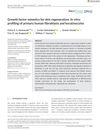Search
for
Sort by
Research
510-540 / 1000+ results
research Expression and Function of Keratinocyte Growth Factor and Activin in Skin Morphogenesis and Cutaneous Wound Repair
KGF and activin are crucial for skin healing and repair.

research Semiology of Skin Toxicity Associated with Epidermal Growth Factor Receptor Inhibitors
Skin problems like acne, dry skin, and nail and hair changes are common in patients taking EGFR inhibitors.
research Taiwanese Dermatological Association Consensus for the Prevention and Management of Epidermal Growth Factor Receptor Tyrosine Kinase Inhibitor-Related Skin Toxicities
The guidelines help doctors manage skin problems from certain cancer treatments to improve patients' lives.

research Nerve Growth Factor and Burn Wound Healing: Update of Molecular Interactions With Skin Cells
Nerve growth factor helps improve healing time and scar quality in burn wounds.

research A Novel Approach to Manage Skin Toxicity Caused by Therapeutic Agents Targeting Epidermal Growth Factor Receptor
New treatment with green tea polyphenols and nicotinamide improves skin problems from cancer therapy.

research 4-Aminopyridine Induces Nerve Growth Factor to Improve Skin Wound Healing and Tissue Regeneration
4-Aminopyridine improves skin wound healing and tissue regeneration by increasing cell growth and promoting nerve repair.

research Differential Expression of Fibromodulin, a Transforming Growth Factor-Beta Modulator, in Fetal Skin Development and Scarless Repair
Fibromodulin might help reduce scarring if increased in adult wounds like in fetal skin that heals without scars.

research Classification and Management of Skin, Hair, Nail, and Mucosal Side Effects of Epidermal Growth Factor Receptor Inhibitors
EGFR inhibitors often cause skin problems and other side effects, but these are usually reversible and can be managed to keep patients comfortable.

research Skin Expression of Mammalian Target of Rapamycin and Forkhead Box Transcription Factor O1, and Serum Insulin-Like Growth Factor-1 in Patients with Acne Vulgaris and Their Relationship with Diet
Eating a high-glycemic diet may worsen acne by increasing certain protein levels and expressions in the skin.

research Strengthening the Skin with Topical Delivery of Keratinocyte Growth Factor-1 Using a Novel DNA Plasmid
Applying a special DNA plasmid to the skin can make it thicker and stronger.
research Suppression of Cutibacterium Acnes-Mediated Inflammatory Reactions by Fibroblast Growth Factor 21 in Skin
FGF21 can help reduce skin inflammation caused by C. acnes.
research Vascularization of Skin Substitute Constructed by Vascular Endothelial Growth Factor 165 Gene-Modified Hair Follicle Stem Cells Compounded with Three-Dimensional Gelatin-Chondroitin Sulfate-Hyaluronic Acid
The modified stem cells with VEGF165 in a special scaffold improved blood vessel growth and wound healing for skin repair.

research Increment of Growth Factors in Mouse Skin Treated with Non-Thermal Plasma
Non-thermal plasma treatment makes mouse skin thicker and increases growth factors without harming the tissue.

research Growth Factor Mimetics for Skin Regeneration: In Vitro Profiling of Primary Human Fibroblasts and Keratinocytes
SUN11602 and ONO-1301 could help in skin healing and creating artificial skin.

research Expression of Nerve Growth Factor in Skin Tissues and Its Effect on the Proliferation of Outer Root Sheath Cells in Cashmere Goats
Nerve growth factor helps cashmere goat hair cells grow and is more active during the hair growth phase.

research Gelatin-Chondroitin-6-Sulfate-Hyaluronic Acid Scaffold Seeded with Vascular Endothelial Growth Factor 165 Modified Hair Follicle Stem Cells as a Three-Dimensional Skin Substitute
Modified rat stem cells on a special scaffold improved blood vessel formation and wound healing in skin substitutes.

research Hair Growth Is Promoted in Mouse Dorsal Skin by a Mixture of Platycladus Orientalis Leaf Extract and Alpha-Terpineol by Increasing Growth Factors and Wnt3/β-Catenin
A mix of Platycladus orientalis leaf extract and alpha-terpineol helps mice grow hair by increasing growth factors and cell growth.

research Hierarchically Assembled Nanofiber Scaffolds With Dual Growth Factor Gradients Promote Skin Wound Healing Through Rapid Cell Recruitment
The new scaffold with two growth factors speeds up skin healing and reduces scarring.
research Study on Expression of Insulin-like Growth Factor-binding Protein-3 and -5 (IGFBP-3 and IGFBP-5) in the Skin of Inner Mongolia Cashmere Goat
IGFBP-5 likely plays a key role in goat hair growth.
research Epidermal Growth Factor Receptor Inhibitors: A Review of Cutaneous Adverse Events and Management
Skin side effects from cancer drugs targeting EGFR can affect treatment adherence but can be managed with antibiotics like tetracycline.

research Safety Profile of Epidermal Growth Factor Receptor Tyrosine Kinase Inhibitors: A Disproportionality Analysis of FDA Adverse Event Reporting System
EGFR-TKIs can cause significant skin, nail, and organ side effects.

research The Incidence and Management of Cutaneous Adverse Events of the Epidermal Growth Factor Receptor Inhibitors
EGFR inhibitors can cause various skin issues during cancer treatment, and managing these is important for patient care.

research Perifollicular Xanthomas Associated With Epidermal Growth Factor Receptor Inhibitor Therapy
EGFR inhibitors can cause yellowish skin eruptions.

research Transforming Growth Factor-Alpha Immunoreactivity During Induced Hair Follicle Growth Cycles in Sheep and Ferrets
TGF-alpha is present in sheep and ferret skin and may affect hair growth without directly stimulating cell proliferation.

research Sustained Release of EGF/bFGF Growth Factors by Mussel-Inspired Core-Shell Nanofibers with Hemostatic and Anti-Inflammatory Effects for Promoting Wound Healing
The new nanofiber improves wound healing by releasing growth factors, reducing inflammation, and helping skin regeneration.

research Epidermal Growth Factor Receptor Inhibitor-Induced Symmetrical Drug-Related Intertriginous and Flexural Exanthema: Should You Discontinue the Offending Agent?
You might not need to stop cancer treatment if you get a rare skin reaction from EGFR inhibitors, as skin treatments can help manage it.

research Extracellular Vesicles From 3D Cultured Dermal Papilla Cells Improve Wound Healing Via Krüppel-Like Factor 4/Vascular Endothelial Growth Factor A-Driven Angiogenesis
Tiny particles from 3D-grown skin cells speed up wound healing by promoting blood vessel growth.

research Fibroblast-Derived Growth Factors and Exosomes as Cosmeceuticals
Fibroblast-derived growth factors and exosomes can significantly improve skin aging.
research Adverse Reaction to Cetuximab, an Epidermal Growth Factor Receptor Inhibitor
Cetuximab often causes skin problems, but they can be managed without stopping treatment.